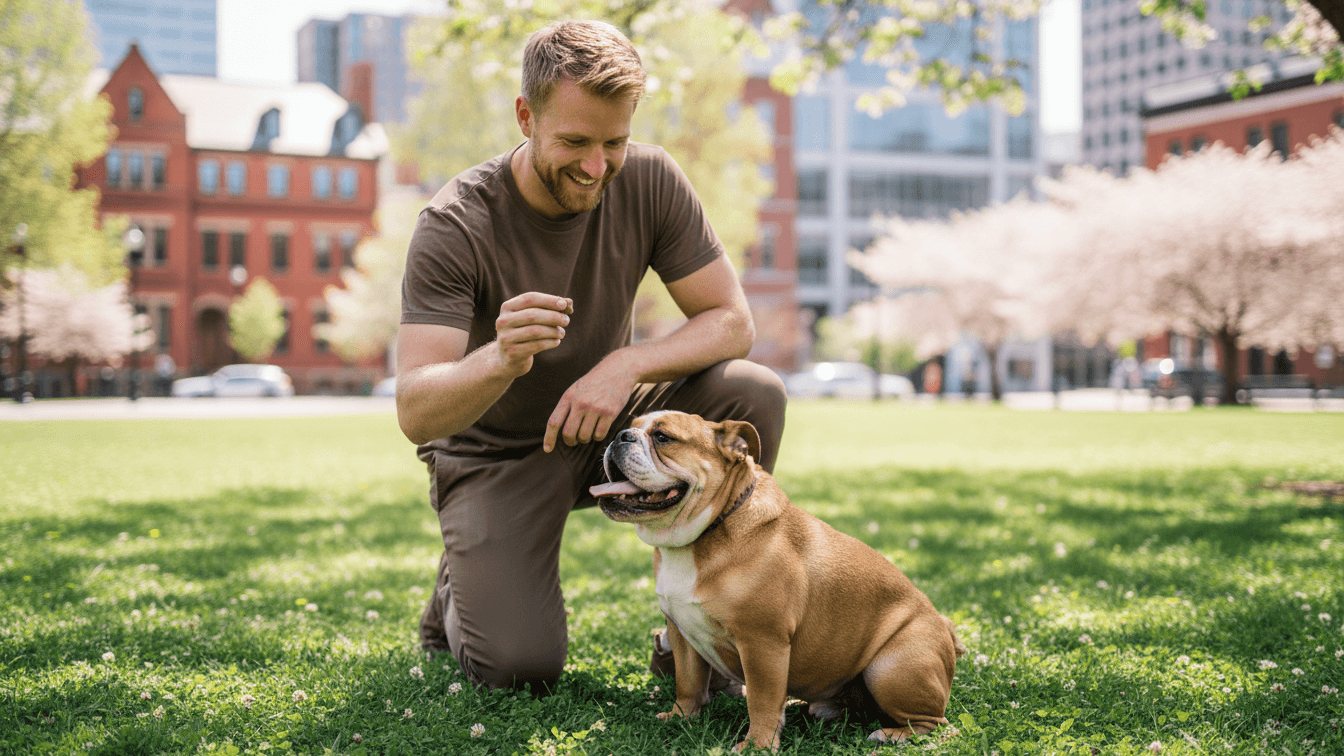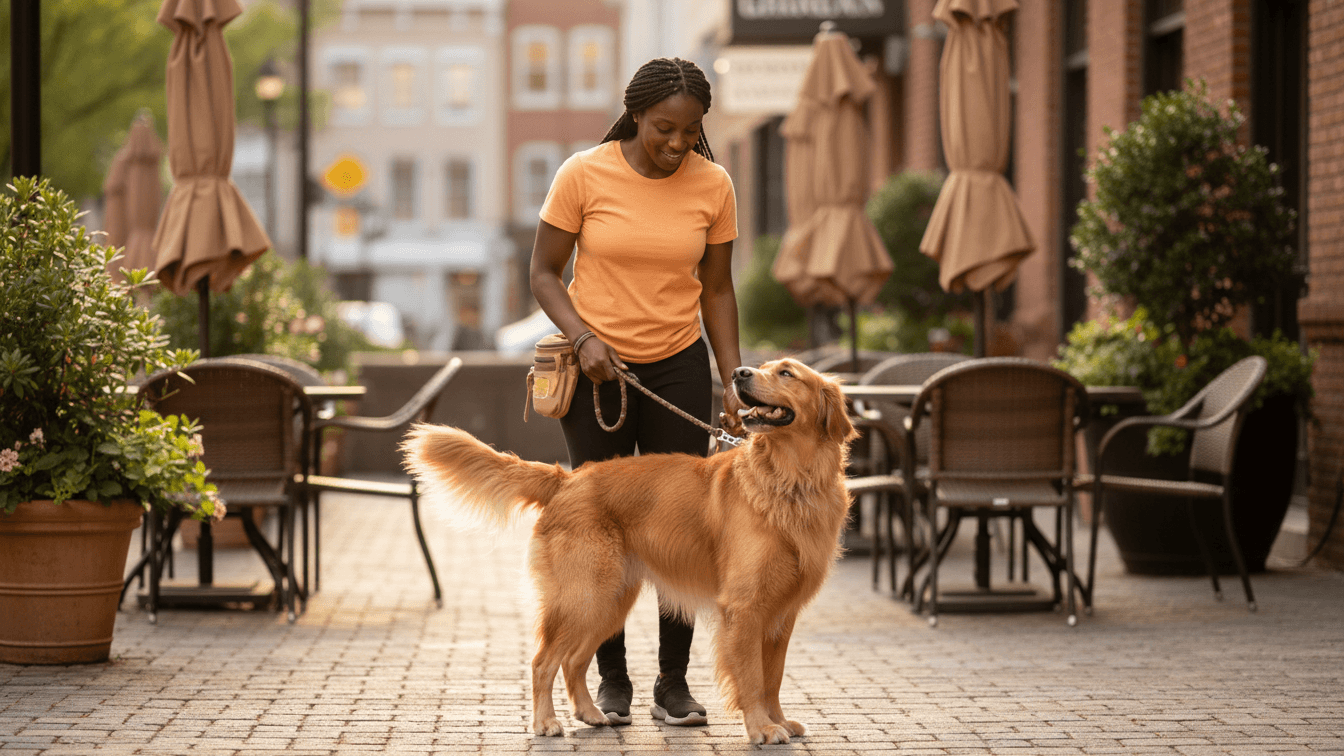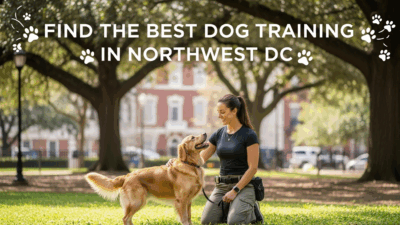Your Complete Guide to Choosing a Dog Trainer in Northwest DC
Living with a dog in Northwest DC means navigating a unique urban landscape full of busy sidewalks, historic neighborhoods, and active parks. Your dog needs to handle everything from crowded sidewalks along Connecticut Avenue to off-leash play at popular recreation areas, all while staying calm around joggers, cyclists, and other city distractions.
The District enforces strict leash laws and animal control regulations throughout all four quadrants. When you find a trainer who understands these local requirements and the specific challenges of city living, you’ll see better results both at home and out in the community.
How to Choose the Right Trainer
Start by looking for someone who uses positive reinforcement training and understands what it takes to raise a well-behaved dog in a dense urban environment. Your dog should learn to walk calmly past outdoor cafes in Dupont Circle, stay focused near the busy trails at Rock Creek Park, and handle Metro buses and sirens without panic.
Credentials give you a quick way to compare trainers’ experience levels. Common dog trainer certifications include KPA-CTP, CPDT-KA, or IAABC-CDBC for behavior problems. If your dog has serious aggression or reactivity issues, look for someone with CBCC-KA or a science-based program like CTC.
In-home dog training works great for apartment-specific challenges like potty training, door manners when guests arrive, and reducing barking that might disturb neighbors. Group classes make sense once your dog can focus around other dogs, especially before you try busy spots like the Adams Morgan Farmers Market or events at Meridian Hill Park.
Ask potential trainers about their experience working with urban dogs and whether they offer training sessions in real-world locations around the District. A professional dog trainer who can coach you through distractions at busy intersections or on crowded sidewalks will give you much more practical help than someone who only works in a quiet indoor facility.
Common Dog Training Methods Explained

Reward-based methods build the trust you want while creating lasting behavior changes. They also help your dog stay calm in high-stress urban situations without resorting to fear or anxiety.
Basic obedience covers sit, down, stay, place, recall, and leash training so your dog can handle walks, restaurant patios, and park visits without pulling or jumping on strangers. These skills are essential when you’re navigating narrow Georgetown sidewalks or waiting at crosswalks during rush hour.
Puppy training focuses on socialization, potty training for apartment living, bite control, crate comfort, and early leash skills. Starting with short, positive training sessions prevents bad habits from forming and helps your puppy adjust to city sounds like sirens, construction, and crowds.
Behavior modification addresses fear, reactivity toward other dogs or people, resource guarding, or separation anxiety through careful desensitization and counterconditioning. For serious cases, ask if your trainer works with local veterinarians who understand behavioral medicine.
Private lessons let you customize everything around your daily routines and your specific neighborhood challenges. Day training can speed up results when you’re short on time and need consistent practice throughout the week.
Dog training classes help your dog practice good manners around other dogs and people in a controlled environment. The best classes give dogs plenty of space, screen participants carefully, and teach calm behavior rather than just excitement.
Specialized training like therapy dog training or service dog training requires extra structure, public-access skills, and a very clear step-by-step training program. These programs prepare dogs for work in hospitals, schools, or to assist handlers with disabilities.
Stay away from trainers who use fear, intimidation, or pain to get results. Humane methods are safer for everyone, easier to maintain long-term, and much better for keeping peace with your neighbors in close-quarters apartment buildings.
Average Cost of Dog Training in Northwest DC (Updated for 2025)
Prices around Northwest DC tend to run higher than suburban areas due to the cost of doing business in the District. Here’s what most local pet owners are paying in 2025.
| Service Type | Average Cost (Northwest DC) |
|---|---|
| Puppy classes (4-6 weeks) | $200-$350 total |
| Group obedience classes (4-6 weeks) | $225-$375 total |
| Private lessons (60-90 min) | $150-$250 per session |
| In-home coaching packages (4-6 visits) | $600-$1,200 total |
| Day training (trainer works your dog + handoff) | $600-$1,200 per week |
| Behavior consult for reactivity/anxiety (initial) | $200-$350 |
| Board and train (2-4 weeks) | $2,800-$5,500 total |
You may pay extra travel fees if your trainer needs to commute from outside the District, and expect higher rates for complex behavior work involving aggression or severe anxiety.
Make sure you understand what’s included in dog training services, how the trainer tracks progress, and whether they offer a free consultation or free evaluation before you sign up. Some trainers include practice outings to busy public spaces as part of their training program, which adds significant value for urban dogs.
Questions to Ask a Potential Dog Trainer
- What training methods do you use, and how do you keep sessions positive and low-stress in urban environments?
- What credentials do you have, like CPDT-KSA or other certifications? Do you keep up with continuing education?
- How will you customize the training plan for my dog’s specific needs and our Northwest DC lifestyle?
- Do you offer in-home visits, group classes, or day training, and which approach fits my goals best?
- Can you work with my dog in real-world locations like busy sidewalks, Metro stations, or crowded parks?
- How will we measure my dog’s progress and know when to add more distractions?
- What are the total costs, including any travel fees, and what’s your cancellation policy?
- Do you carry liability insurance, and can you show me proof?
- For behavior problems, will you work with my veterinarian if needed?
- What should I practice between our sessions to help my dog keep improving?
Local Northwest DC Rules and Considerations
The District of Columbia enforces strict leash laws and animal control regulations to keep parks, sidewalks, and neighborhoods safe for everyone. Understanding these rules will help you train your dog while staying compliant with local ordinances.
Leashes are required in all public spaces except inside designated dog parks. The District requires leashes no longer than four feet in most public areas, though some parks post specific signage. Keep a short leash with you for crowded sidewalks along Wisconsin Avenue, M Street, and other high-traffic corridors.
DC law requires current rabies vaccination and registration with DC Health for all dogs over four months old. You can register your dog online through the Department of Health Animal Services Division and must renew annually. Your dog should wear their registration tag whenever they’re in public.
Excessive barking can be considered a nuisance under DC’s noise ordinance, especially in apartment buildings and row houses where neighbors share walls. Work with your trainer on alert barking and separation anxiety before you receive complaints from neighbors or your building management.
The District requires dog waste to be picked up immediately in all public spaces. Failing to clean up after your dog can result in fines, and it’s one of the most common complaints in densely populated neighborhoods.
DC doesn’t require special licenses for dog trainers, but reputable expert dog trainers should carry liability insurance for their business. If a trainer offers board and train services or operates a training facility, they may need additional permits through the Department of Consumer and Regulatory Affairs.
Dogs are prohibited from playgrounds, public pools, and certain areas of Rock Creek Park during specific seasons. Always check posted signage at parks and recreation areas before letting your dog explore.
Local Northwest DC Resources for Dog Owners
These spots give you great places to practice polite manners, work on recalls, and provide safe enrichment for your dog. Always follow the posted rules and etiquette guidelines.
- S Street Dog Park (between 17th and 18th Streets NW) offers a small fenced area perfect for socialization and off-leash practice in a controlled environment.
- Glover Archbold Park (stretching from Van Ness to the Potomac) provides miles of wooded trails where leashed dogs can practice focus around wildlife, joggers, and other trail users.
- Rock Creek Park (throughout Northwest DC) welcomes leashed dogs on most trails and offers varied terrain for building your dog’s confidence around natural obstacles, water, and changing elevations.
- Shaw Dog Park (11th and R Streets NW) features separate areas for small and large dogs, making it ideal for careful socialization work with puppies or reactive dogs during quiet hours.

FAQs
How much does in-home dog training cost?
Most Northwest DC trainers charge $150-$250 per in-home visit, with discounts available when you buy packages. Behavior problems typically start at the higher end of that range, especially if your trainer needs to work on apartment-specific issues like hallway reactivity or elevator manners.
Is in-home dog training worth it?
Absolutely, because you’re working on problems exactly where they happen. Your trainer can fix door manners, jumping on guests, counter-surfing, and reduce barking that might disturb neighbors, then step outside to practice leash skills on your actual neighborhood sidewalks and near the distractions your dog encounters daily.
Can you pay someone to house train your dog?
Yes, many trainers offer puppy classes and coaching that include potty training for apartment living, crate routines, and daily schedules. Day training can speed up the process while teaching you how to maintain the progress, which is especially helpful for busy professionals working long hours.
What is the 3-3-3 rule for dog training?
This is a helpful timeline for new or adopted dogs: expect about 3 days for your dog to decompress, 3 weeks to learn your routines, and 3 months to feel completely settled. Good training for dogs works with this natural adjustment period rather than rushing results.
How long will it take to reach my training goals?
Most puppies and friendly adult dogs show solid progress within 4-8 weeks if you practice daily. Fear, reactivity, or aggression typically requires several months of careful behavior modification with gradual increases in difficulty. Urban environments add extra challenges, so be patient as your dog learns to handle construction noise, crowds, and other city stressors.
What should I bring to group classes?
Pack a flat collar or harness, a 4-6 foot leash, high-value treats, water, and current vaccination records if your trainer requests them. Leave retractable leashes at home for safety reasons, as they don’t give you enough control in close quarters.
What’s the leash law in Northwest DC?
Dogs must be leashed and under control in all public areas throughout the District, except inside designated off-leash dog parks. DC law specifies leashes should be four feet or shorter in most areas, though some parks may have different rules posted. Keep your dog on a short leash for crowded sidewalks and high-traffic areas.
Do I need a dog license in Northwest DC or the District?
Yes, all dogs over four months old must be registered annually with DC Health. You can register online through the Department of Health Animal Services Division, and your dog must wear their registration tag in public. Registration fees are lower for spayed or neutered dogs.
What shots does my dog need in the District or DC?
Rabies vaccination is required by law for all dogs in the District. Your veterinarian may also recommend distemper-parvo, leptospirosis, and bordetella based on your dog’s lifestyle and exposure to other dogs. Keep vaccination records current for dog park access and boarding facilities.
Are dog trainers required to be licensed in Northwest DC or the District?
No special trainer licenses exist in the District of Columbia. Trainers follow normal business regulations through the Department of Licensing. However, if they offer board and train services or operate a training facility, they may need additional permits and should carry liability insurance.
Where can I practice off-leash recall?
Use fenced dog parks like S Street Dog Park or Shaw Dog Park to keep things safe and legal. Try visiting during quieter hours in the early morning or late evening when you’re starting out. Never practice off-leash recall in unfenced areas within the District, as leash laws apply everywhere outside designated dog parks.
Which dog parks allow training around Northwest DC?
S Street Dog Park and Shaw Dog Park both allow off-leash play within their fenced areas during posted hours. These parks work well for practicing recalls, socialization, and calm greetings with other dogs. Avoid peak times if your dog is still building confidence or working through reactivity issues.
What beaches or trails allow dogs for training?
While the District doesn’t have beaches, leashed dogs are welcome on most trails throughout Rock Creek Park and Glover Archbold Park. These trails are perfect for teaching calm focus around joggers, cyclists, families, and wildlife. The C&O Canal towpath just across the District line in Georgetown also allows leashed dogs and offers flat, easy terrain for building endurance and practicing loose-leash walking.
How do I handle my reactive dog on busy DC sidewalks?
Work with a certified dog trainer who specializes in reactivity and behavior modification. Start training in quieter residential streets before gradually working up to busier areas. Practice techniques like the “find it” game to redirect your dog’s attention before they react, and learn to recognize your dog’s threshold distance so you can create space before situations escalate.
What do I do if my dog is aggressive toward other dogs?
Contact a trainer with experience in aggressive dog training and behavior modification as soon as possible. Look for credentials like KPA-CTP or IAABC-CDBC that indicate specialized knowledge. Your trainer should conduct a thorough assessment, possibly work with your veterinarian to rule out pain or medical issues, and create a careful desensitization plan that keeps everyone safe.
The right combination of thoughtful planning, humane methods, and consistent practice around Northwest DC’s parks and neighborhoods will help your dog become a confident, well-behaved dog. Whether you’re walking through Dupont Circle, exploring trails at Rock Creek Park, or simply managing daily life in your apartment building, working with expert dog trainers who understand urban challenges will make all the difference in reaching your goals.
